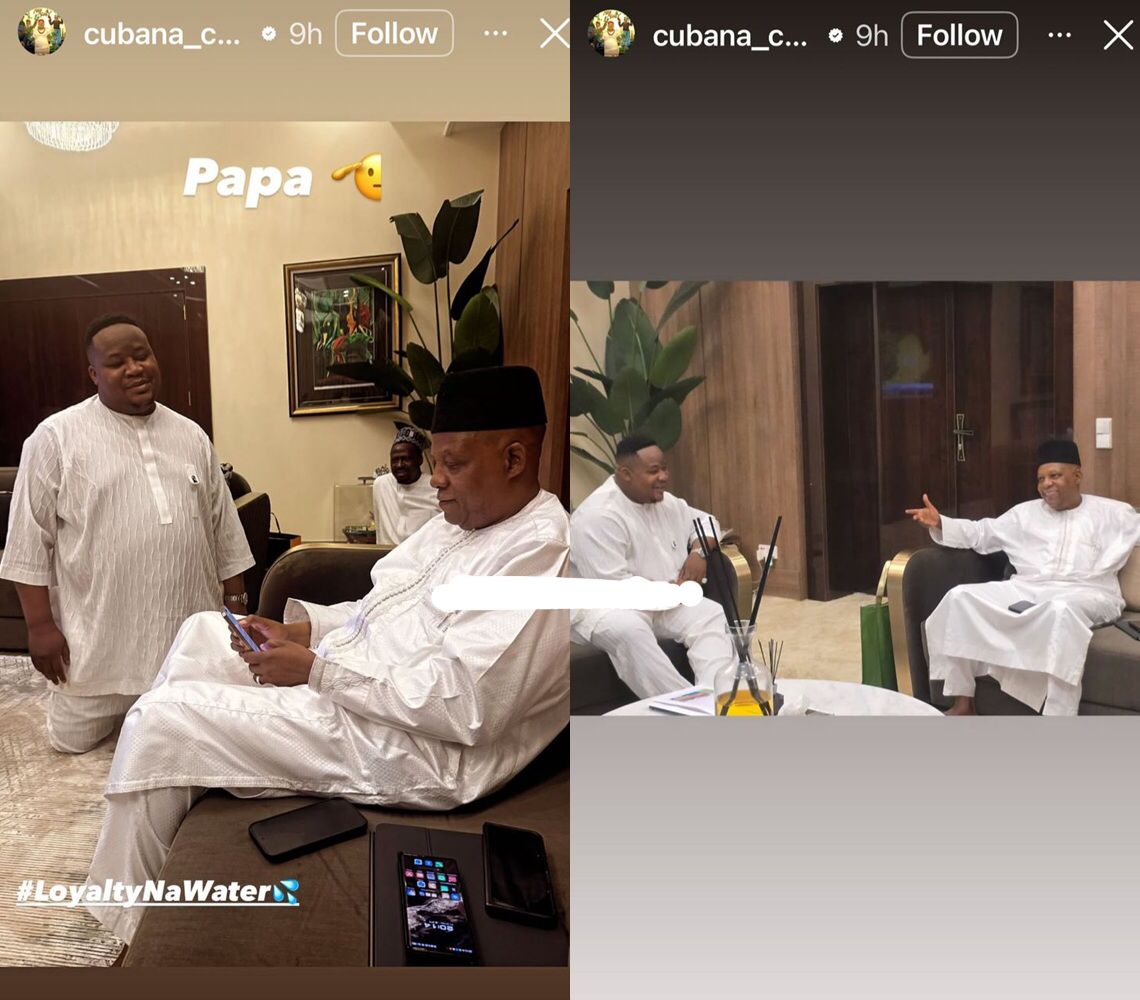
Loyalty Na Water: Cubana Chief Priest Kneels Before Vice President Kashim Shettima, Sparking Waves Across Nigeria

In a striking and widely discussed moment that has captivated Nigerians across social media and beyond, popular Nigerian nightlife entrepreneur, Cubana Chief Priest, was seen kneeling before Vice President Kashim Shettima during a recent public event. The act, simple yet profoundly symbolic, instantly set tongues wagging and sparked a tidal wave of reactions—ranging from admiration to heated debate—on the meaning of loyalty, respect, and tradition in modern Nigerian society.
Cubana Chief Priest, known for his flamboyant lifestyle and immense influence in the entertainment and hospitality sectors, has never been one to shy away from the spotlight. Yet, this particular display of reverence to one of Nigeria’s highest political figures is different from his usual bravado. The scene unfolded when the Vice President made an appearance at an event attended by many notable personalities from various sectors of Nigerian society. As VP Shettima approached, Cubana Chief Priest spontaneously dropped to his knees, a gesture that many interpreted as an expression of deep respect and loyalty.
This gesture of kneeling is culturally significant and layered with meaning in many African societies. It is a sign of humility, allegiance, and honor, especially when directed towards someone of high status or authority. For Cubana Chief Priest, the act was not just about paying respect to a political figure but also an acknowledgment of the Vice President’s influence and leadership. The phrase that quickly gained traction alongside this viral moment—“Loyalty na water”—aptly encapsulates the sentiment. Loyalty, like water, is essential, nourishing, and indispensable for sustaining relationships and communal bonds.
The internet erupted almost immediately after the video surfaced, with Nigerians flooding Twitter, Instagram, and Facebook with their opinions. Supporters of the act praised Cubana Chief Priest for his humility and for demonstrating the kind of respect that many feel has been lost in contemporary Nigeria. For them, the image was a refreshing reminder of the importance of loyalty and respect towards leaders who serve the nation. It stirred conversations about the value of honoring those in authority as a way to foster unity and progress.
Conversely, critics were quick to voice their concerns and discomfort. Some argued that such an act bordered on excessive subservience and questioned whether such gestures were appropriate in a modern democratic society where leaders are meant to serve the people. Others saw it as a calculated move, questioning whether Cubana Chief Priest was seeking political favor or attempting to align himself with power for personal gain. This faction cautioned against confusing loyalty with blind obedience, urging Nigerians to hold their leaders accountable rather than show uncritical reverence.
Politically, the moment comes at a sensitive time in Nigeria’s landscape. Vice President Kashim Shettima, a key figure in the ruling government, has been instrumental in shaping policies and representing the administration’s interests. His presence commands respect in many quarters, and Cubana Chief Priest’s act could be seen as a reflection of the wider respect he commands among influential Nigerians. At the same time, the timing of the event and the public nature of the gesture have fueled speculation about emerging alliances and the intersection between entertainment and politics in the country.
This incident also highlights the growing trend of Nigerian celebrities and influencers openly engaging with political figures, a phenomenon that has been on the rise in recent years. These interactions often blur the lines between entertainment, politics, and public opinion, raising questions about the role of cultural icons in shaping political narratives. Cubana Chief Priest’s kneeling moment has thus become a symbol of this evolving dynamic—where loyalty, influence, and power intersect in unexpected ways.
Furthermore, the phrase “Loyalty na water” itself has transcended the moment, becoming a viral catchphrase that Nigerians use to emphasize the importance of steadfastness in relationships, whether personal, professional, or political. The metaphor evokes the idea that loyalty, much like water, is a fundamental necessity—without it, bonds dry up and disintegrate. In a country often characterized by shifting alliances and political upheaval, the phrase resonates deeply.
The reactions also reflect the diverse perspectives within Nigeria’s socio-political fabric. On one hand, there is a strong cultural emphasis on respect for elders and leaders, rooted in tradition and communal values. On the other, there is a growing demand for democratic ideals such as equality, accountability, and transparency, which sometimes clash with traditional displays of loyalty. Cubana Chief Priest’s act inadvertently spotlighted this tension, prompting Nigerians to reflect on how best to balance respect with critical citizenship.
As the story continues to unfold, it has sparked broader discussions beyond Nigeria’s borders about the symbolism of loyalty in African leadership and the role of public figures in modeling societal values. It also raises questions about the future of political engagement among celebrities, who wield significant influence over public opinion and can shape national discourse.
In conclusion, the image of Cubana Chief Priest kneeling before Vice President Kashim Shettima has become more than just a moment frozen in time—it is a powerful narrative about loyalty, respect, and the complex interplay of culture and politics in Nigeria. Whether celebrated as a profound gesture of allegiance or critiqued as an act of excessive deference, it undeniably captured the attention of a nation hungry for meaningful leadership and authentic connections. As Nigerians continue to debate and dissect the moment, one thing remains clear: loyalty, like water, remains an essential element in the fabric of Nigerian society, shaping relationships and influencing the course of the nation’s future.


